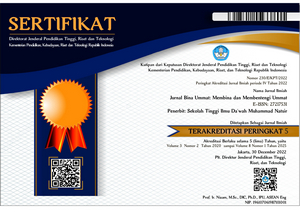TRANSFORMASI MANAJEMEN PENDIDIKAN ISLAM DALAM ERA DIGITAL: STUDI KASUS PONDOK PESANTREN
DOI:
https://doi.org/10.38214/jurnalbinaummatstidnatsir.v8i1.329Keywords:
digital transformation, Islamic education, pondok pesantren, education management, e-learningAbstract
The digital transformation in Islamic education has become an urgent necessity in response to technological advancements. Islamic boarding schools (pondok pesantren) face challenges in integrating technology into their learning and management systems while maintaining Islamic values. This study aims to analyze the implementation of digitalization in pesantren education, the challenges encountered, and the strategies that can be applied to optimize the use of technology. Using a qualitative descriptive approach, data was collected through interviews, observations, and literature studies. The findings indicate that digitalization in pesantren education includes technology-based administration, online learning, and the use of social media for dakwah and communication. However, challenges such as limited infrastructure, the readiness of human resources, and difficulties in preserving traditional values remain significant obstacles. Therefore, strategies such as strengthening digital infrastructure, enhancing technological literacy for educators and students, and fostering collaboration with external parties are essential to support pesantren digitalization. With the right approach, digitalization can effectively enhance the quality of Islamic education in the modern era while preserving its fundamental values
Published
Issue
Section
This work is licensed under a Lisensi Creative Commons Atribusi 4.0 Internasional.
Authors who publish with this journal agree to the following terms:
- Authors retain copyright and grant the journal right of first publication with the work simultaneously licensed under a Creative Commons Attribution License that allows others to share the work with an acknowledgment of the work's authorship and initial publication in this journal.
- Authors are able to enter into separate, additional contractual arrangements for the non-exclusive distribution of the journal's published version of the work (e.g., post it to an institutional repository or publish it in a book), with an acknowledgment of its initial publication in this journal.
- Authors are permitted and encouraged to post their work online (e.g., in institutional repositories or on their website) prior to and during the submission process, as it can lead to productive exchanges, as well as earlier and greater citation of published work (See The Effect of Open Access).



